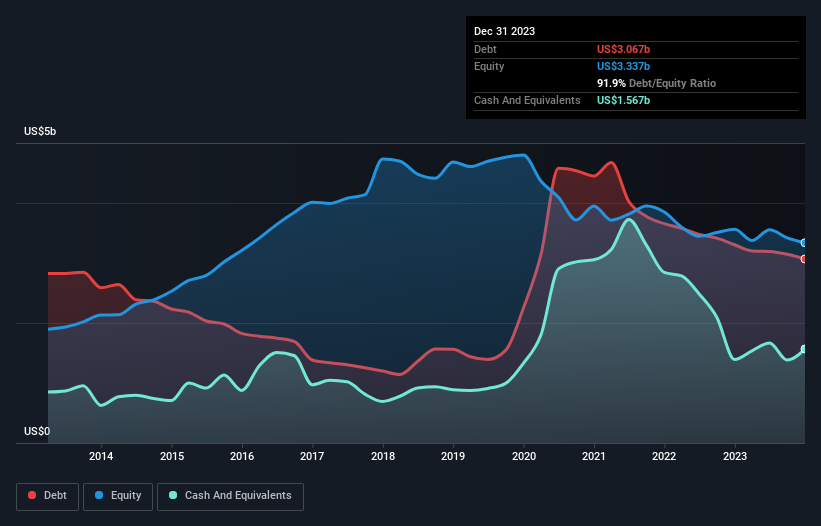
Some say volatility, rather than debt, is the best way to think about risk as an investor, but Warren Buffett famously said that 'Volatility is far from synonymous with risk.' So it might be obvious that you need to consider debt, when you think about how risky any given stock is, because too much debt can sink a company. We can see that JetBlue Airways Corporation (NASDAQ:JBLU) does use debt in its business. But is this debt a concern to shareholders?
What Risk Does Debt Bring?
Generally speaking, debt only becomes a real problem when a company can't easily pay it off, either by raising capital or with its own cash flow. In the worst case scenario, a company can go bankrupt if it cannot pay its creditors. However, a more frequent (but still costly) occurrence is where a company must issue shares at bargain-basement prices, permanently diluting shareholders, just to shore up its balance sheet. Of course, debt can be an important tool in businesses, particularly capital heavy businesses. When we examine debt levels, we first consider both cash and debt levels, together.
Check out our latest analysis for JetBlue Airways
What Is JetBlue Airways's Debt?
The image below, which you can click on for greater detail, shows that JetBlue Airways had debt of US$3.07b at the end of December 2023, a reduction from US$3.30b over a year. However, because it has a cash reserve of US$1.57b, its net debt is less, at about US$1.50b.

How Strong Is JetBlue Airways' Balance Sheet?
We can see from the most recent balance sheet that JetBlue Airways had liabilities of US$3.63b falling due within a year, and liabilities of US$6.89b due beyond that. Offsetting these obligations, it had cash of US$1.57b as well as receivables valued at US$336.0m due within 12 months. So it has liabilities totalling US$8.61b more than its cash and near-term receivables, combined.
The deficiency here weighs heavily on the US$2.28b company itself, as if a child were struggling under the weight of an enormous back-pack full of books, his sports gear, and a trumpet. So we definitely think shareholders need to watch this one closely. After all, JetBlue Airways would likely require a major re-capitalisation if it had to pay its creditors today. When analysing debt levels, the balance sheet is the obvious place to start. But it is future earnings, more than anything, that will determine JetBlue Airways's ability to maintain a healthy balance sheet going forward. So if you're focused on the future you can check out this free report showing analyst profit forecasts.
In the last year JetBlue Airways wasn't profitable at an EBIT level, but managed to grow its revenue by 5.0%, to US$9.6b. We usually like to see faster growth from unprofitable companies, but each to their own.
Caveat Emptor
Over the last twelve months JetBlue Airways produced an earnings before interest and tax (EBIT) loss. Indeed, it lost US$33m at the EBIT level. Combining this information with the significant liabilities we already touched on makes us very hesitant about this stock, to say the least. Of course, it may be able to improve its situation with a bit of luck and good execution. Nevertheless, we would not bet on it given that it vaporized US$806m in cash over the last twelve months, and it doesn't have much by way of liquid assets. So we consider this a high risk stock and we wouldn't be at all surprised if the company asks shareholders for money before long. The balance sheet is clearly the area to focus on when you are analysing debt. However, not all investment risk resides within the balance sheet - far from it. For example, we've discovered 3 warning signs for JetBlue Airways (1 is potentially serious!) that you should be aware of before investing here.
If you're interested in investing in businesses that can grow profits without the burden of debt, then check out this free list of growing businesses that have net cash on the balance sheet.
New: Manage All Your Stock Portfolios in One Place
We've created the ultimate portfolio companion for stock investors, and it's free.
• Connect an unlimited number of Portfolios and see your total in one currency
• Be alerted to new Warning Signs or Risks via email or mobile
• Track the Fair Value of your stocks
Have feedback on this article? Concerned about the content? Get in touch with us directly. Alternatively, email editorial-team (at) simplywallst.com.
This article by Simply Wall St is general in nature. We provide commentary based on historical data and analyst forecasts only using an unbiased methodology and our articles are not intended to be financial advice. It does not constitute a recommendation to buy or sell any stock, and does not take account of your objectives, or your financial situation. We aim to bring you long-term focused analysis driven by fundamental data. Note that our analysis may not factor in the latest price-sensitive company announcements or qualitative material. Simply Wall St has no position in any stocks mentioned.
About NasdaqGS:JBLU
Undervalued very low.
Similar Companies
Market Insights
Community Narratives



